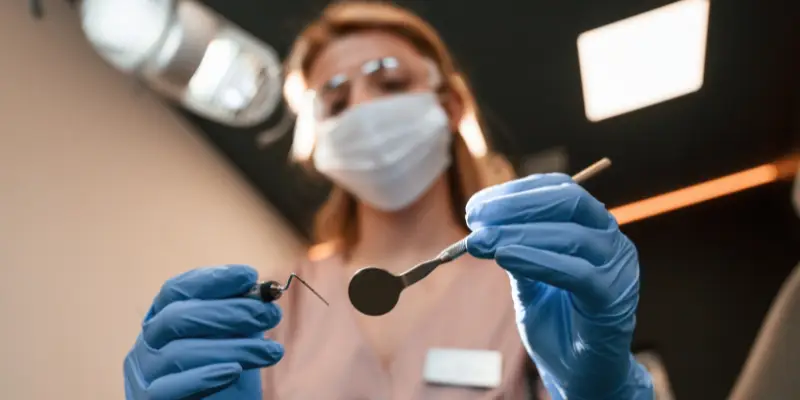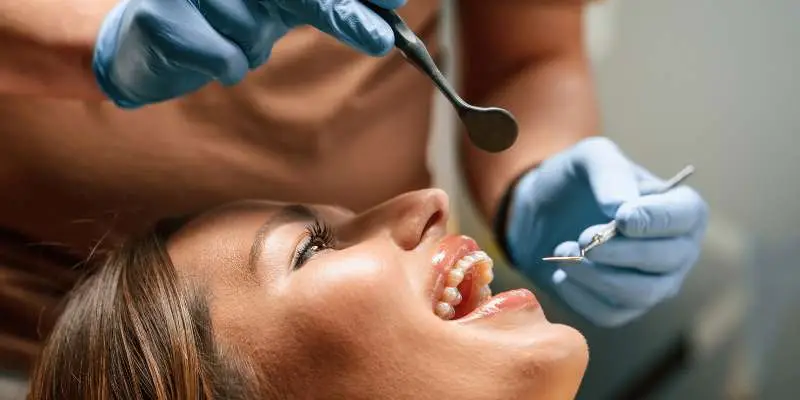Gum disease, a silent ailment affecting a significant portion of the UK population, often goes unnoticed until it becomes severe.
Understanding its treatment is not just beneficial; it’s essential for maintaining overall health and preventing further complications.
The Basics of Gum Disease
Gum disease, or periodontal disease, is a condition that affects the tissues supporting the teeth. It’s primarily caused by poor oral hygiene leading to plaque buildup. If left untreated, it can result in tooth loss and has been linked to other serious health issues.
Recognising the early signs of gum disease can be the difference between simple preventive measures and more complex treatments. Symptoms often include swollen, red gums, bleeding during brushing, and persistent bad breath.
Types of Gum Disease
There are two main stages of gum disease: gingivitis and periodontitis. Gingivitis, the milder form, affects only the gums. It’s reversible with good oral hygiene. Periodontitis, on the other hand, affects the bone and supporting tissues and can lead to irreversible damage.
Understanding these types is crucial for early intervention and effective treatment.
Risk Factors
Several factors can increase your risk of developing gum disease. These include smoking, diabetes, hormonal changes in women, medications that reduce saliva flow, and genetic susceptibility. Being aware of these can help in taking preventive steps.
One patient, John, a 45-year-old smoker, came to me with early signs of periodontitis. By quitting smoking and improving his oral hygiene, we managed to halt the progression of the disease significantly.
Treatment Options
The treatment of gum disease varies depending on the severity of the condition. The primary goal is to control the infection and, if possible, eliminate it.
Early stages can often be managed with non-surgical treatments, while advanced cases may require surgical intervention.
Non-Surgical Treatments
Scaling and root planing is a deep cleaning procedure that removes plaque and tartar from above and below the gum line. Antibiotics can also be used to help control bacterial infection.
These treatments are effective in stopping the disease from progressing and can help in the regeneration of gum tissue.
Another non-surgical treatment option is antimicrobial therapy. This involves using antimicrobial mouth rinses or gels to reduce the levels of bacteria causing the gum disease. These products can reach areas that are difficult to clean with a toothbrush or floss, aiding in the healing process.
Moreover, laser therapy has emerged as a promising non-surgical treatment for gum disease. Laser technology can target and remove infected tissue while promoting the regeneration of healthy gums. It’s a minimally invasive procedure with less discomfort and faster healing times.
Surgical Treatments
For more advanced cases, surgical options such as flap surgery or bone and tissue grafts may be necessary. These procedures aim to reduce the depth of the gum pockets and regenerate lost bone and tissue.
While these treatments are more invasive, they can be highly effective in restoring oral health.
In cases where gum disease has caused significant gum recession, soft tissue grafting may be recommended. This procedure involves taking tissue from the roof of the mouth or another source and attaching it to the receded gum area. It helps cover exposed tooth roots, reduce sensitivity, and improve the overall appearance of the smile.
Another surgical intervention for severe gum disease is guided tissue regeneration. This technique involves placing a barrier membrane between the gum and bone to prevent gum tissue from growing into the bone space, allowing the bone to regenerate. It’s a specialized procedure that requires expertise but can yield excellent results in saving teeth affected by advanced periodontitis.
Prevention and Maintenance
Preventing gum disease is always preferable to treating it. Good oral hygiene practices, such as regular brushing and flossing, are essential. Regular dental check-ups can also catch early signs before they develop into more serious conditions.
Maintenance after treatment is crucial for preventing recurrence. This includes continued good oral hygiene and possibly more frequent dental cleanings.
Lifestyle Changes
Making lifestyle changes can significantly impact the prevention and management of gum disease. Quitting smoking, managing diabetes, and maintaining a healthy diet can all contribute to healthier gums.
These changes not only improve oral health but can enhance overall well-being.
The Role of Dental Professionals
Dental professionals play a crucial role in both the treatment and prevention of gum disease. They can provide personalised advice, professional cleanings, and treatment plans tailored to individual needs.
Building a good relationship with your dentist and hygienist is an essential part of maintaining oral health.
Conclusion
Gum disease is a prevalent condition with potentially serious consequences. However, with the right knowledge and care, it’s preventable and treatable. Understanding the basics, recognising the signs, and seeking professional advice are key steps in managing this condition.
Remember, taking care of your gums is taking care of your overall health. Don’t let gum disease go unnoticed. If you have any concerns about your oral health, consult your dental professional today.
Don’t wait until gum disease progresses further, compromising your smile and overall health.
At Danbury Dental Care, we’re committed to providing you with the comprehensive care you need. Book an appointment now for an initial consultation where we’ll conduct X-rays, develop a personalized treatment plan, and assist you in prioritising the necessary treatments. Take the first step towards healthier gums and a healthier you by visiting Danbury Dental Care today.








